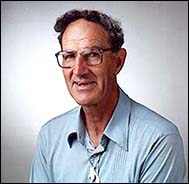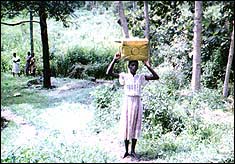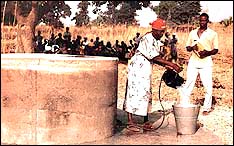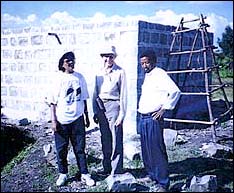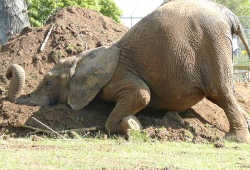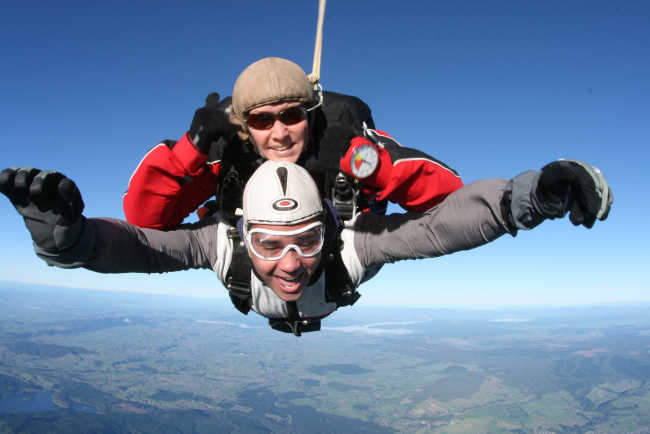Dorothy – 7/11/98
An interview with Hugh Thorpe, coordinator of the Christchurch ‘Water for Survival’ group.
|
|
| Hugh Thorpe |
The name
says it all. Human beings cannot survive and be healthy without water – to drink, to wash themselves and their clothes, to water their crops.
One in four people must carry water home. Yet for one quarter of the world’s population the only way to get water is to fetch it, often from a source many kilometres from home. This task is done by the women and children and their health is often severely impaired by carrying such heavy loads.
|
|
| A girl in Uganda carrying a 20 kg load of water up hill |
What is the quality of the water that they carry? Often it is unsafe water and the result is sickness. Tens of thousands of children die every day from diseases caused by unsafe water and inadequate sanitation. Often the situation is aggravated because people are ignorant about good hygiene.
What is the Water for Survival group in New Zealand? Ten years ago some engineers in Auckland became very concerned about the water problems in many third world countries and the huge need for clean water. They formed a group called Water for Survival.
This group did not aim to work on projects in the field, but has limited its activities to raising money to meet the huge need. The prime movers in the group needed to be people with time to devote to its aims and enough expertise to be able to speak persuasively to others about the needs and the suggested projects that the group was funding.
Three key elements Clean water, sanitation and health education are seen as the greatest needs. If any one of these three is missing the work will be far less effective. People must understand why clean water is important and why there must be a satisfactory way of disposing of human wastes.
Use of the funds “Water for Survival is handling other people’s money and it is used with great caution,” Hugh explained.
Most of the money raised is sent to a sister organisation in the United Kingdom, WaterAid, which has identical objectives to Water for Survival. The great majority of Water for Survival’s on-the-ground activity is through WaterAid as this is a much larger organisation and in many countries in Africa and parts of Asia it has representatives actively involved in water projects.
Hugh emphasised that it is crucially important with any aid work where lines of communication are very long to have some kind of trusted person or agency on the ground. Otherwise there are opportunities for misunderstanding, mismanagement and corruption. WaterAid has a very efficient set-up and Water for Survival is very happy to work through it. It is more economical to use WaterAid’s infrastructure than to use valued funds building a separate one for Water for Survival.
Hugh has lived overseas in third world countries and had the opportunity to see what happened with other projects in the years before Water for Survival began. Sometimes a lot of money was spent on aid to set up a project, but if there was no representative to check on the suitability of the project for the region and its people then much of the money was wasted. The difficulties that he witnessed in aid work were not technical, but political and social.
Funds increased by subsidies Water for Survival gets a two-for-one subsidy from the Government for every dollar it raises – an increase in the last year from one-for one. The money comes as a block grant for the year and a report must be sent on how the money has been spent. Naturally the Government does not take this report on trust. At the beginning of this year the Ministry of Foreign Affairs and Trade sent some contracted people overseas into the field to view the activities that Water for Survival has funded in Ethiopia and Ghana. They reported very favourably on the overall organisation within New Zealand, their interaction with WaterAid and the organisations in Africa, and their effectiveness in translating that money into facilities in the villages.
When the money passes to WaterAid the British Government gives a one-for-one subsidy, so money raised has fourfold value in the field.
Support from Rotary Clubs Last year Hugh conducted a personal campaign to Rotary Clubs in Canterbury. He spoke to thirteen clubs and three undertook to support a project. In speaking to them Hugh emphasised that Water for Survival is efficient, effective and hard-headed about where the money goes and what it is spent on.
Water for Survival has to be sure that the project is meeting a genuine need and that it is supported by the people of the village where it is to be built. There must be liaison with a person or an organisation on the ground – either a WaterAid representative or a local Non-Governmental Organisation. In India it would be the NGO Rural Center for Human Interests, a well run organisation working in the villages to promote good health.
Sponsoring groups get an identified project. Any group sponsoring a project gets an identified project, costed in detail, and telling the group how many people will benefit. At the end of the project the group will receive a detailed completion report showing how Water for Survival has used the money which has been raised.
Some Water for Survival projects Spring protection in Uganda The Ugandan girl in the photo further up is carrying clean water from a spring at Rukungiri where Water for Survival has put in spring protection. It is a very common form of water supply improvement. The ground is an excellent filter for removing bacterial and other contamination. The objective of protecting a spring is to prevent surface water contaminating the spring water. A stone and concrete structure was built to make the collection of water easier and safer and to improve the water quality.
Hand dug wells in Ghana
|
|
| Improved water and education in a village in Ghana. |
Water for Survival is supporting wells in the Upper East region of Ghana. Each well requires a donation of $1,685 and will serve about 250 people. In the photo a villager is collecting water from the new hand-dug well. Initially a bucket is used to draw water. If the community can raise sufficient funds a hand pump can be fitted. A health education meeting is in progress under the tree in the background.
Village water supplies in Ethiopia After suffering from many years of civil war and the disastrous famine of 1984/5 Ethiopians have a will to rebuild their country and are very grateful for the help provided by Water for Survival. WaterAid’s operation in Ethiopia is completely managed by Ethiopians.
|
|
| The Water for Survival secretary with the Ethiopian Woman Engineer/Project Manager Yeshumenesh Minas (left) beside the stone reservoir, at Hela Jeiko village in Ethiopia |
Tenth Birthday Dinners project The Tenth Birthday Dinners which the Auckland and Christchurch groups held to celebrate the tenth birthday of the organisation raised the money for tube wells and sanitation for A R Ropham Village, Madakasira, South India.
Visit from Greg Whiteside, WaterAid representative in Nepal At the birthday dinners the speaker was Greg Whiteside who works for WaterAid in Nepal. He was lead speaker at the New Zealand Water and Wastes Ass. Conference in Wellington. In twelve days in New Zealand he spoke to 1265 people – excellent publicity for Water for Survival.
He emphasised the importance of developing right relationships with the local people and securing their full involvement in the scheme. “The role of external development agencies is about trying to be a catalyst to start a community moving without leading the process. The western education system makes us very unsuited to managing the process. What we are principally talking about in community based approaches is inverting the power relationships. Traditionally the expert comes in from on high, usually with a big ego, all the resources and a sense that they can provide a solution which will solve the problem. We need to de-tune professional expertise in the water sector coming down and listening more, allowing communities to express their intentions , their capabilities, what they can give to the process. This requires the expert to shut up, to listen and to facilitate.”
Dedicated leadership from the Laroche family The director of Water for Survival since its initiation has been John Laroche. He took early retirement from the water supply authority in Auckland where he was one of the water engineers and has since worked full time on a voluntary basis for Water for Survival. His wife, Sue, has provided superb back-up as treasurer. Their daughter has contributed her graphic design skills to the cause.
There are three centres with organising committees – Auckland, Wellington and Christchurch but there are supporters in other centres around the country.
Activities held in Christchurch Money raising activities held in Christchurch have included an Open Day at the Sewage Treatment Plant which raised $2,500 and a clean-up picking up rubbish around the Burwood landfill. The Christchurch City Council pays for this work which is necessary to keep the site tidy, especially in windy weather.
Young people involved Each year one of the members of the Christchurch group, Ken Couling, talks to the children in one of the classes at Redcliffs Primary School about Water for Survival and the need for water in developing countries. On a Saturday morning he leads them on an expedition to the lower reaches of the Heathcote River where they put on their gumboots and wade through the mud picking up metal and plastic and filling skips with the rubbish. This raises a significant sum for the funds of Water for Survival.
Water for Survival’s recipe for successful fund raising For this group the key to successful fund raising is enthusing other people to work for the cause. People respond warmly to the concept of providing water and sanitary facilities. They actually enjoy the work that is done and the chance to meet and talk with people as they work.
People making changes The members of Water for Survival and their supporters are indeed people making changes – life saving changes – as they raise money to bring clean water, sanitation and health education for the survival of people in remote villages in developing countries.
For further information contact either Hugh Thorpe Email address: h.thorpe@cad.canterbury.ac.nz or John LaRoche Email address: johnwfs@clear.net.nz

